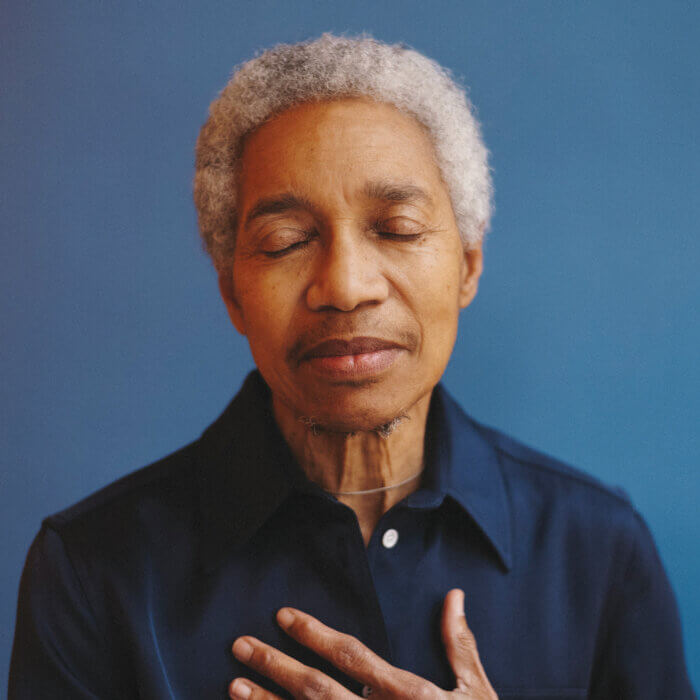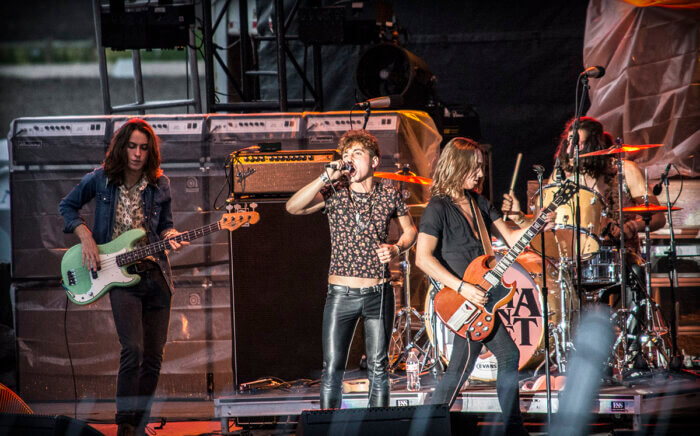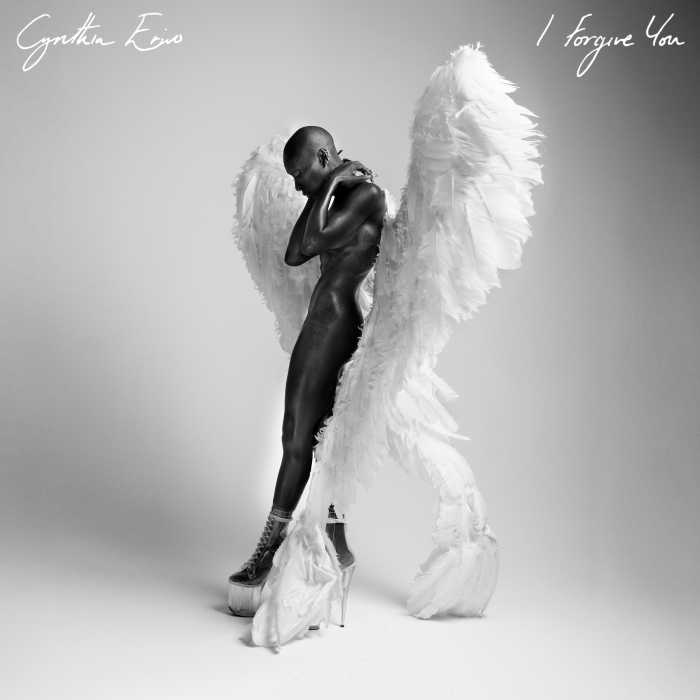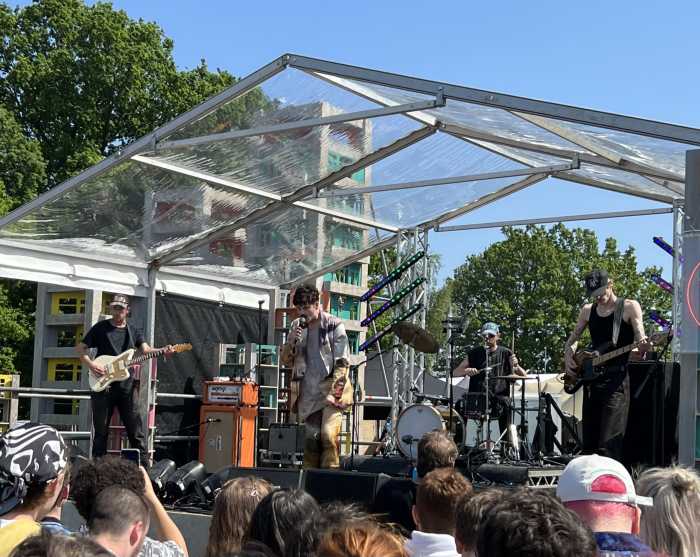This month, Gay City News reviews recent albums by out rapper Big Freedia, trans singer/composer Beverly Glenn-Copeland, and the band Greta van Fleet.
Big Freedia | “Central City” | Queen Diva Music
Big Freedia is half diva, half drill sergeant. Her music intends to start a party, as long as she can loom over it, shouting commands like “bend over, bounce it over and get it over” and “I need to see a lot of ass everywhere.” Although she identifies as a gay man, with Big Freedia starting as a drag persona, she refuses to be pinned down to a single set of pronouns or exact gender. Her voice captures the impact of a crunching 808. Her second album “Central City” is a perpetual motion machine.
She got to icon status without becoming a star via radio play and hit singles. Releasing her first single in 1999, she was part of New Orleans’ bounce scene (which also included queer rappers Sissy Nobby and Katey Red), but she’s outlasted its popularity and found a national audience. Still, heterosexual rappers like Lil’ Wayne and Juvenile became major stars out of bounce music in the 2000s, when Cash Money Records promoted it on a massive scale. (Lil’ Wayne gets a feature on “El Niño,” and Cash Money house producer Mannie Fresh worked on “Central City.”)
Even when Big Freedia sings the praises of women’s asses, as on “Booty Like a Drummer,” she addresses them as subjects rather than objects, making her less palatable to a wide audience than Juvenile’s ultra-straight 1999 hit “Back That Azz Up.”
By now, Big Freedia has starred in the six-season reality show “Big Freedia: Queen of Bounce” and been sampled on Drake’s “Nice for What” and Beyoncé’s “Formation” and “Break My Soul,” but her success came with a glass ceiling. “Central City” is only her second studio album, following nine years of singles and eps.
The ghosts of New Orleans jazz still march through Big Freedia’s drum programming and raucous synthetic horns, filtered through cheap synthesizers. (The Soul Rebels provide live backing on “Voodoo Magic.”) As celebratory as her music is — the sentiments of “Motivate Ya” run behind it, even if they’re mostly unstated — it refuses to quiet down. Her beats are abrasive. “NOLA Babies” and “Gin In My System” ascend into glorious noise, overdubbing Big Freedia’s voice so she trips over herself. No wonder she likens herself to Bigfoot.
But the abundance of guests outside Big Freedia’s world threatens the party. At base, she’s still working from a local scene with a fully defined sound. Incorporating R&B singers — Ciara on “$100 Bill,” Sonyae on “You Already Know,” Faith Evans on “Bitch You Want” — means that she has to slow things down and soften up to give them some space. Even Lil’ Wayne’s verse dilutes “El Niño” a little. “Central City” is most exciting when it crackles with volume and distortion. Thankfully, that’s most of the time.
Beverly Glenn-Copeland | “The Ones Ahead” | Transgressive | July 28th

Ageism be damned — Beverly Glenn-Copeland’s 79 years of life experience give “The Ones Ahead” its power.
Tenderness and care resonate through every song. The chorus of “People of the Loon” beckons “come a little bit closer,” inviting the listener in by stating “each of us to others is connected.” The bass solo on “Harbour (Song For Elizabeth)” whispers a caress to Glenn-Copeland’s wife. He maintains a positive tone that feels hard-won, following his transition to identifying as a man in 2002 and almost losing his house when COVID forced him to cancel a 2020 tour.
Glenn-Copeland began recording in the ‘70s, traversing several genres — folk on his first two albums, New Age on the 1986 “Keyboard Fantasies” — but the music industry rarely makes space for Black artists whose sound can’t be readily pinned down and marketed. Although the CBC signed him and released his debut album, they only pressed 250 copies. (Born in Philadelphia, he’s lived in Canada for his adult life.) Similarly, “Keyboard Fantasies” was originally released by Glenn-Copeland himself as a run of 200 cassettes with Xeroxed packaging. Its re-discovery by electronic musicians more than a generation later revived his career.
“The Ones Ahead” runs through every facet of his work, but eclectic as it is, the album never becomes mere pastiche. Backed by the band Indigo Rising, Glenn-Copeland’s voice is utterly unique, like hearing Nina Simone or Joni Mitchell for the first time. “The Ones Ahead” reflects both his classical training, where he learned to sing German lieder, and devotion to his African and African-American roots. The swarming percussion on “Africa Calling,” inspired by Glenn-Copeland’s ‘80s work with drummer Dido, begins with individual instruments, but quickly swell into an enormous sea of rhythm. His voice murmurs or soars with equal power. Gospel and opera nestle cheek to cheek. The spare “Love Takes All” leans towards the torch song, but Glenn-Copeland’s tone lacks the melancholy that usually comes with the form. These songs’ austerity hints at ambient music, while their positive spirit suggests the best of New Age, minus the woo. “People of the Loon” borrows a touch of melodrama, while “Stand Anthem” plays gospel-inspired vocals over a relaxed bed of African percussion.
Glenn-Copeland’s independent releases could easily have gone ignored forever. Rather than profiting from his own music, he earned a living working in children’s TV for years. We’re very lucky that “The Ones Ahead,” only Glenn-Copeland’s seventh album in more than 50 years, even exists, much less that it’s one of 2023’s most exciting releases.
Greta van Fleet | “Starcatcher” | Lava/Republic | July 21st

As rock music has turned into a niche in which only a few contemporary bands, like Tame Impala and Arctic Monkeys, can compete commercially with albums that Fleetwood Mac or Queen released decades ago, Greta van Fleet have achieved a rare degree of mainstream popularity. Their first two albums have gone gold. Despite (or perhaps because of) this success, they’re also one of the most widely hated artists in the current music scene. Jeremy Larson’s review of their album “Anthem of the Peaceful Army” for Pitchfork gave it a 1.6/10 rating, which has defined music critics’ attitudes towards them. The album began, “Greta Van Fleet sound like they did weed exactly once, called the cops, and tried to record a Led Zeppelin album before they arrested themselves. The poor kids from Frankenmuth, Michigan don’t even realize they’re more of an algorithmic fever dream than an actual rock band.”
Larson went far beyond simply listing the reasons why he dislikes Greta van Flee’s music towards mocking every aspect of the band.
Their fan base has not helped matters. The comments under their YouTube videos reveals their appeal to middle-aged men who wish that Freddie Mercury and AC/DC singer Bon Scott were still alive and teens who long for a supposedly more exciting past. Many of their fans are unable to praise Greta van Fleet for their own merits without showing a reactionary contempt for pop and hip-hop dripping with racist and sexist undertones. None of the many songs that sampled the drum break from Led Zeppelin’s “When the Levee Breaks,” which include tracks by Beyoncé, Ice-T, the Beastie Boys, Eminem and trans rapper Backxwash, sound nearly as close to the song itself as Greta van Fleet’s originals, which shows the fallacy of their attitude. All the same, blaming musicians’ fans for their own flaws is rather dubious; they’re not responsible for the social media posts of their most conservative listeners.
Greta van Fleet’s image contains an androgynous flair that’s long been part of male rock musicians’ presentation, going back to Little Richard, even if it hasn’t always been an expression of actual queerness. So few men performing this kind of hard rock have been openly queer that it came as a surprise when Greta van Fleet singer Josh Kiszka came out as a member of the LGBTQ community last June. He said he did so in response to homophobic and transphobic legislation: “Where I’ve settled a home in Tennessee, legislators are proposing bills that threaten the freedom of love. It’s imperative that I speak my truth for not only myself, but in hopes to change hearts, minds, and laws in Tennessee and beyond. These issues are especially close to my heart as I’ve been in a loving, same-sex relationship with my partner for the past 8 years.”
In his newfound openness towards this kind of political statement, Kiszka has stopped clinging to tradition, but his music still sounds like ‘70s rock cosplay. Their song and video for “Meeting the Messenger,” the first single from “Starcatcher,” bear an odd resemblance to the album that actor Linus Roache released in character as fictional hippie cult leader Jeremiah Sands. It does not help that Kiszka sings so much at the very highest notes of his range. His falsetto obliterates the band’s melodies, adding an unintentional degree of noise.
Greta von Fleet’s mixture of earnest uncoolness and a degree of self-awareness could be promising. Ghost, the only other contemporary band at the same level of popularity working with ‘70s and ‘80s hard rock, embraces theatricality with a degree of wit and irony — and a flair for pop melody — missing from Greta van Fleet. The band isn’t devoid of talent: “Sacred The Thread” and “The Indigo Streak” are potentially catchy songs, although not performed in a way that emphasizes their hooks. Still, the entire sub-genres of doom metal and stoner rock beat Greta van Fleet at this game.
I wanted to listen to Greta van Fleet with fresh ears, knowing Kiszka’s sexuality. But Queen’s Broadway/opera-infused hard rock already queered the genre back in the ‘70s, and “Starcatcher” adds nothing new to the form. Music critics may be unfair in singling out Greta van Fleet for their lack of originality, when equally derivative artists working in hipper forms, like synth-pop, get a more open-minded treatment. Adopting old-fashioned rock stardom as a theatrical costume has much more potential as an idea than they’ve lived up to: Queer, non-binary singer Yves Tumor is currently performing a deeply imaginative version of glam rock. Beyond that, Kiszka’s voice simply makes for difficult listening.
My problems with Greta van Fleeet’s music are not intended as a criticism of the band as people. I sympathize with the pain Kiszka must have felt living his entire adult life in a relationship hidden from the public, as he’s become increasingly famous, until last month. I hope that he’s much happier after his decision to come out, and that he helps some of Greta van Fleet’s more conservative fans realize the downside of devotion to the past’s values.



































